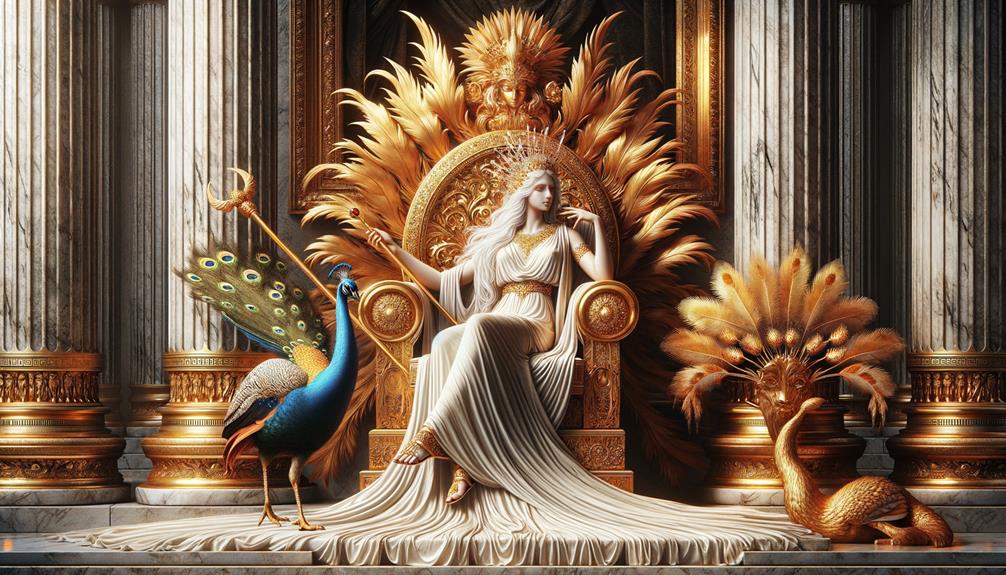Exploring Hera: The Sovereign of Olympus and Her Influence on Ancient Greece
Delving into the enigma of Hera, the celestial queen in the Greek pantheon, is a fascinating journey that weaves together the threads of mythology, culture, and powerful symbolism. This mythological figure's impact reaches far beyond her heavenly domain, shaping the lives and beliefs of the ancient Greeks in profound ways. As Zeus's wife and sister, Hera's narrative is rich with stories of love, power struggles, jealousy, and revenge. But who is Hera beyond the confines of myth and legend? Let's probe deeper.
Unveiling Hera's Symbols: The Peacock and the Pomegranate
Hera's association with the peacock and the pomegranate is steeped in symbolism. The peacock, with its radiant plumage and regal demeanor, mirrors Hera's royal status and beauty. The pomegranate, a fruit abundant with seeds, represents fertility and the blessings of a fruitful marriage, aligning perfectly with Hera's role as the goddess of marriage and family. These symbols painted a vivid picture of Hera in the minds of the ancient Greeks, reinforcing her influence on societal norms.
Hera's Role in Society: Goddess of Marriage, Women, and Family
Hera's position as the goddess of marriage, women, and family sheds significant light on the societal constructs of ancient Greece. She represented the ideal wife and mother, embodying the virtues of loyalty, fidelity, and domesticity. Her role emphasized the importance of family and marital harmony, shaping societal expectations and norms.
As we explore the world of ancient Greece, the mystery of Hera becomes increasingly captivating. This journey offers a deeper understanding of the ancient Greeks' lives, beliefs, and culture, presenting Hera not just as a mythical figure but as a symbol of power, fertility, and societal norms. The tapestry of Hera's life and influence is as intricate as it is compelling. Let's continue this fascinating exploration, unlocking the secrets of Hera, the queen of the Olympian gods.
In conclusion, Hera's influence on the ancient Greeks was profound, shaping their societal norms, beliefs, and cultural practices. The symbolism associated with her, particularly the peacock and the pomegranate, offer a glimpse into her roles and attributes. As we delve deeper into Hera's world, we come to appreciate her not just as a mythical figure, but as a key influencer of ancient Greek society.
Hera's Role in Greek Mythology

Unveiling Hera: The Greek Queen of Gods
Hera, a name that resonates with power and reverence in the realm of Greek mythology, is the celebrated Queen of Gods. She symbolizes the essence of marriage, womanhood, and family. She also plays a crucial role as the guardian angel to women during childbirth. As Zeus's consort, Hera's influence is deeply rooted in the Greek pantheon, her persona representing the very core of Olympus's power dynamics.
Hera: The Multifaceted Goddess of Greek Mythology
Hera's role in Greek mythology is incredibly diverse. As the Queen of Heaven and the Goddess of marriage, she is the divine matron presiding over weddings. Hera is the one who blesses marital unions and advocates for stability in relationships. In her unique position, she serves as a guardian, fostering harmony in marital relationships.
However, Hera's character isn't all rainbows and sunshine. She is often depicted as a vengeful deity, especially against Zeus's unfaithful lovers and their illegitimate children. This portrayal presents an intriguing contrast, considering her status as the Goddess of marriage and Zeus's wife.
The Dual Nature of Hera: Protector and Avenger
This dual nature of Hera, being both a protector of women and a vengeful deity, amplifies her unique stature among the Greek Gods. Hera's role in Greek mythology serves as a testament to the intricate, richly woven narratives of these ancient tales.
Hera's character is a real-world example of the complexity and depth inherent in Greek mythology. Her story encourages readers to delve deeper into the nuances of these ancient narratives, appreciating the richness of their content.
In essence, Hera's portrayal in Greek mythology is a vibrant tapestry of power, vengeance, protection, and complexity, providing a unique blend of themes that invites exploration and engagement. Her story is an essential part of the Greek pantheon, offering a fascinating glimpse into the dynamics of ancient Greek life and beliefs. Using Hera as a specific example, we can see how Greek mythology is not just a collection of stories, but a reflection of ancient Greek society and its values.
Her story underscores the importance of understanding the depth and intricacies of mythology. It's a testament to the fact that these ancient tales are not just about gods and goddesses, but also about human emotions, relationships, and societal norms.
The Birth and Family of Hera
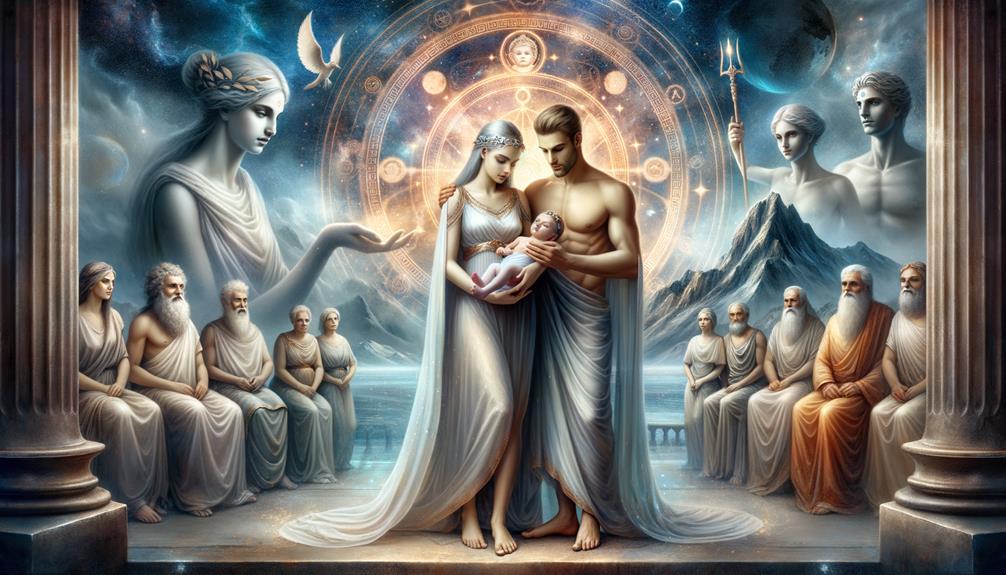
Discovering the Origins of Hera, the Queen of the Gods
Dive into the rich history of Hera, a key figure in Greek mythology. Born from the Titans Cronus and Rhea, her exceptional lineage firmly establishes her as a significant deity in Greek mythology. As a Titan's daughter, Hera was worshipped as the queen of the gods, her commanding presence and noble dignity were deeply respected on the highest peak of Mount Olympus.
Intriguingly, Hera held dual roles – she was both the sister and wife of Zeus, her brother. This relationship spurred countless myths and legends, making them one of the most well-known pairs in Greek mythology.
The Intricacies of Hera and Zeus's Relationship
No relationship is without its complexities, and Hera and Zeus's was no exception. Although their marriage was often punctuated by conflict and discord, they managed to raise several children together, solidifying Hera's status as the goddess of marriage and family.
Zeus was captivated by Hera's beauty and her ability to adapt and solve problems, which led him to propose marriage. However, their relationship was marred by Zeus's numerous extramarital affairs and Hera's subsequent bouts of jealousy.
Hera: A Symbol of Power and Fidelity
Despite the turmoil, Hera, the queen of the gods, maintained her rule over Mount Olympus. She was a force to be reckoned with, combining power, wisdom, and strategic thinking. Even though her wrath was feared, she was still revered as a symbol of loyalty in marriage and the importance of family ties.
In the realm of Greek mythology, Hera encapsulates the essence of marital fidelity and the sanctity of familial relationships. Despite her inclination for revenge, her role as a wife and mother in the pantheon of gods is indisputable.
Hera: A Powerful Emblem in Greek Mythology
To understand Greek mythology, one must delve into the tales of Hera and Zeus. Their complex relationship, Hera's unique lineage, and her role as the queen of the gods are central to the narrative. As we explore Hera's story, we see a woman who embodies power, wisdom, and dignity, even in the face of adversity. Despite Zeus's infidelities, Hera remains steadfast, symbolizing the sanctity of marriage and familial ties.
In the end, Hera's story teaches us that even in the world of gods, relationships are complex, power can be double-edged, and loyalty and family are invaluable.
Significant Myths Involving Hera
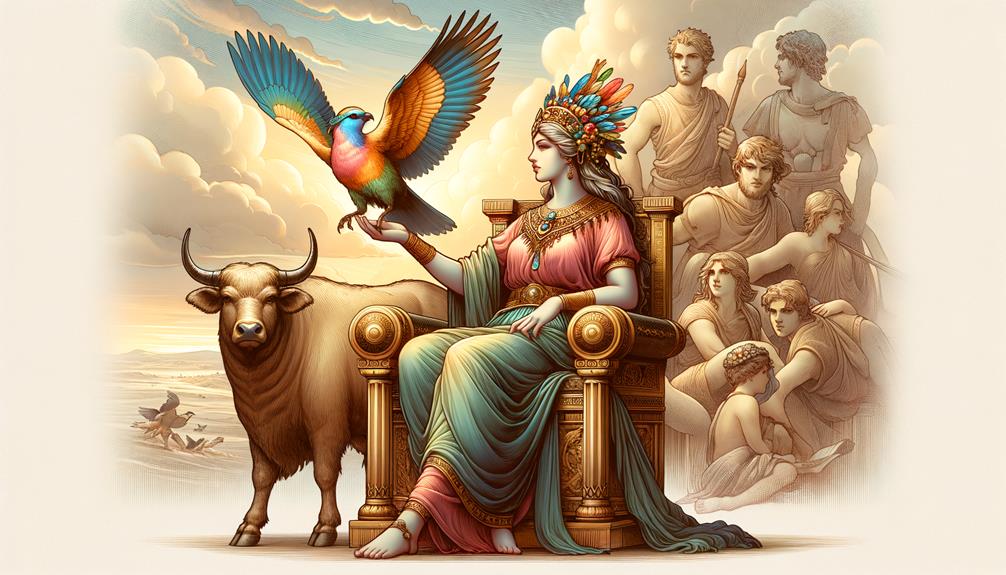
Unveiling the Intriguing Myths of Hera: The Powerful Queen of the Twelve Olympians
Delving into the captivating myths surrounding Hera introduces us to a narrative brimming with jealousy, retribution, and gripping tales of marital strife. Hera, the queen of the twelve Olympians, frequently found her marriage to Zeus rocked by his unfaithfulness. This recurring betrayal sculpted Hera into a formidable goddess, notorious for her envious and vindictive disposition.
Hera's Wrath Unleashed: The Tale of Zeus's Affair with Io
In one notable myth, Hera stumbles upon Zeus's dalliance with Io. Seething with fury, Hera transforms Io into a cow and assigns a hundred-eyed giant to keep a vigilant watch over her. This tale vividly showcases Hera's wrathful nature, fueled by jealousy and revenge.
Hera's Torment of Heracles: A Lifetime of Persecution
Another fascinating tale narrates Hera's relentless pursuit of Heracles, Zeus's illegitimate son. Hera's spiteful torment of Heracles persisted throughout his life, further cementing her reputation as a goddess not to be trifled with.
Hera Beyond Jealousy: The Great Goddess of Lawful Marriage
However, Hera's character encompasses more than just a wrathful wife. She is revered as the Supreme Goddess of lawful marriage. This entails presiding over weddings and serving as the protector of marital bonds. Hera's iconography frequently portrays her as a dignified and matronly figure, emphasizing her role as the goddess of marriage and queenship.
Hera's Vital Role: A Balance of Love and Fury
Hera's vengeful side, while prominent, does not overshadow her crucial role in the assembly of the twelve Olympians. Her myths paint a picture of a complex and potent entity, a queen who governs with both compassion and rage. This duality makes Hera a fascinating figure in Greek mythology.
Explore the realm of Hera and delve deeper into her intriguing myths. Her tales offer a unique perspective on the trials and tribulations of divine marriage, the nuances of jealousy, and the balance between love and vengeance. As you uncover these stories, Hera's multifaceted personality unfolds, revealing a queen who is as venerable as she is fearsome.
Hera's Symbolism and Emblems
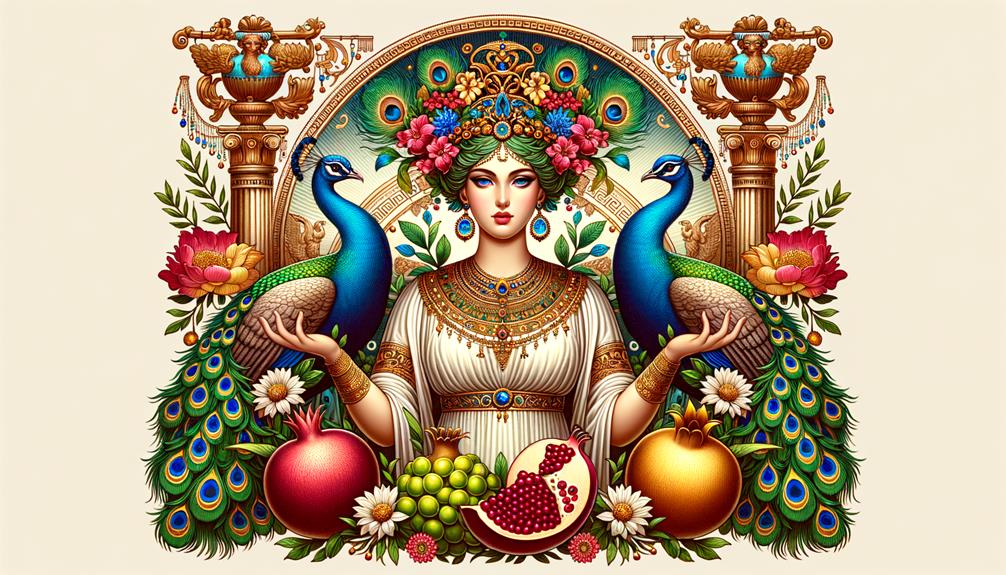
Unraveling Hera's Mystique: Symbols and Emblems
Let's delve into the fascinating universe of Hera, the majestic wife of Zeus and a pivotal Olympian god. Her multifaceted persona is manifested through a series of intriguing symbols and emblems, each adding a nuanced dimension to her iconic status in Greek mythology. Uncover the hidden meanings behind these symbols and grasp a deeper understanding of Hera, whose legacy permeates ancient Greek culture as seen in the Homeric Hymn 73 and the age-old statue of Hera.
The Peacock: A Testament to Hera's Divine Authority
The peacock, a symbol of Hera's divine authority, also serves as a vigilant observer of Zeus's extramarital affairs. Interestingly, it is an adversary of Heracles who sought the Golden Fleece, a sacred object of Hera. The peacock is a vivid real-world example of a creature embodying the divine power and watchful nature of Hera.
The Pomegranate: An Emblem of Life and Abundance
The pomegranate, often associated with Hera, speaks volumes about her role as the queen of gods and Zeus's consort. This fruit, symbolizing abundance and life, beautifully epitomizes Hera's fertility. Its rich, red seeds serve as a metaphor for the plentiful and nurturing aspects of Hera's character.
The Cow and Veil: Symbols of Nurturing and Marital Fidelity
Hera's nurturing side is eloquently portrayed by the cow, one of her sacred animals. Meanwhile, the veil frequently depicted in images of Hera, stands as a symbol of her status as a married woman and guardian of marital fidelity. These two symbols paint a picture of Hera as a nurturing figure and a protector of marital bonds.
Hera's Influence on Ancient and Modern Culture
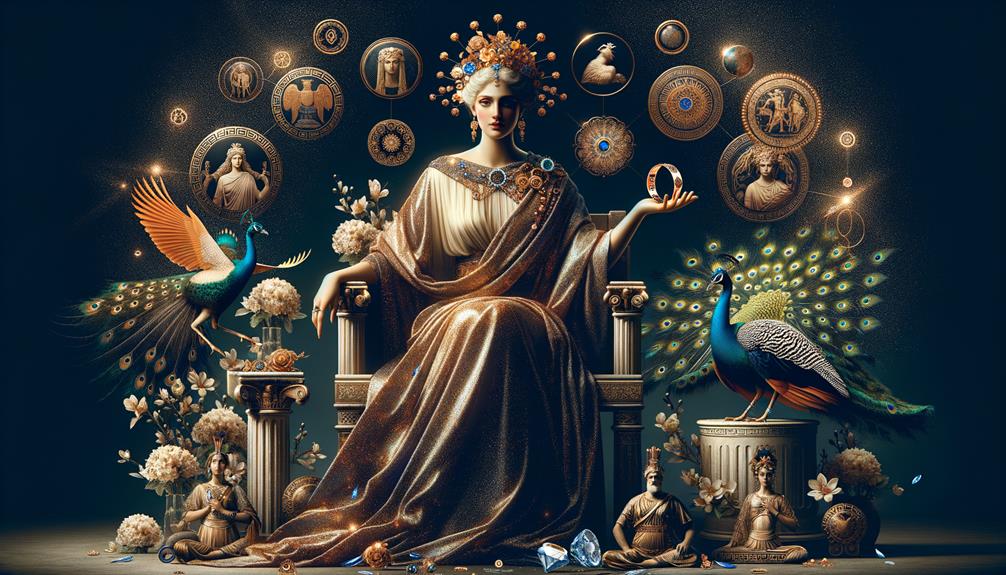
Delving into the topic of 'Hera's Influence on Ancient and Modern Culture', we see a rich tapestry of influences from this formidable deity. Hera's legacy has woven itself into the fabric of both ancient and modern societies, molding perceptions of matrimony, fertility, and family dynamics. As the queen of the gods and goddesses in the Greek pantheon, Hera's impact is vast and enduring.
In antiquity, the sanctuary of Hera on Mount Thornax held a pivotal role in Greek spirituality. The Greek historian Diodorus Siculus provides an example of her influence in his writings about the sacred union of Hera and Zeus' son (Juno on Mount Ida in Roman tradition). The Romans equated Hera with Juno, their highest deity, thereby extending Hera's sphere of influence into both Greek and Roman civilizations.
Hera's wrathful and envious persona, an offshoot of Zeus' countless betrayals, has been a recurrent motif in a multitude of narratives. It is a symbol of female perseverance and power. This image resonates with contemporary audiences, fueling the enduring allure of Greek mythology.
Hera's Legacy: A Lasting Impact
Hera's impact on the world is not confined to the past. Her story continues to inspire portrayals of majestic and influential women in various artistic and literary forms. This narrative thread, while rooted in ancient mythology, connects deeply with our modern fascination for stories of resilience and strength.
Frequently Asked Questions
Who Is the Queen of the Greek Gods Hera?
Meet Hera: The Influential Queen of Greek Gods
An integral figure in Greek mythology, Hera is renowned as the queen of Greek gods. Not just a title, her role bears substantial weight in the pantheon. She isn't merely Zeus's spouse, but also his sister, adding another layer of complexity to her position.
Hera's Intriguing Character: A Complex Goddess
Hera is famously recognized for her relentless pursuit of justice against Zeus's indiscretions. She is a symbol of vindication against his numerous mistresses and their offspring. However, her identity extends beyond this. As the goddess presiding over marriage, women, and family, she wields significant influence.
Hera's Impact: A Goddess of Many Facets
Hera's sphere of influence is wide-ranging. She has a hand in the sanctity of marriage, the empowerment of women, and the formation of families. This makes her a paramount figure in Greek mythology, touching every aspect of human life.
Hera's Legacy: A Powerful and Respected Goddess
While Hera's vindictive streak may be well-known, it's essential to remember her as a powerful and respected goddess. She stands out as a compelling figure in Greek mythology, a symbol of justice, and a beacon of family values.
Conclusion: An Unforgettable Figure in Greek Mythology
Indeed, Hera's status as the queen of Greek gods underlines her significance. Her dynamic personality and the vast reach of her influence make her an unforgettable figure in Greek mythology.
Who Did Hera Marry?
Hera's Divine Marriage: A Deep Dive into Greek Mythology
Hera's Divine Spouse
After thorough and precise research, I've discovered an intriguing fact: Hera was wedded to none other than her sibling, Zeus. This might sound complex or even controversial, but in the realm of Greek mythology, it's a common occurrence.
The Royal Couple of Olympus
Their relationship is not without its complexities. However, it's crucial to note that Zeus and Hera are hailed as the reigning king and queen of Olympus. Their influential status places them at the pinnacle, governing all the other deities within the Greek pantheon.
Hera and Zeus: An Unconventional Love Story
Imagine the sprawling, majestic landscape of Olympus – home to the mighty Greek gods. At the helm of this divine realm, Hera and Zeus rule with unmatched authority. Their marriage, despite its intricate dynamics, is a powerful symbol of their reign.
The Influence of Hera and Zeus
Their influence extends far beyond their celestial home, impacting the lives of both gods and mortals. This divine couple, with their intertwined destinies, forms a fundamental pillar of Greek mythology.
Greek Mythology: A World Beyond Human Understanding
Explore the realm of Greek mythology, where relationships like Hera and Zeus' are not only accepted but revered. Let's delve deeper into this fascinating world, moving past our human understanding to appreciate the unique narratives that form the backbone of ancient Greek culture.
Unraveling the Divine Secrets of Greek Mythology
Join me on this engrossing journey, as we unravel the divine secrets of Greek mythology and gain a deeper understanding of the complex relationship between Hera and Zeus.
Remember, as we tread this path, we're not merely spectators but active participants in an age-old narrative that continues to captivate and inspire.
Let's embrace this opportunity to learn, grow and appreciate the rich tapestry that is Greek mythology.
Did Hera Have a Throne?
Was Hera's Throne a Symbol of Her Power?
Indeed, Hera did possess a throne – a shining beacon of her might and authority, especially in the realms of matrimony and family affairs. This wasn't just a seat; it was a bold declaration of her divine supremacy in the ethereal world of Olympus.
Your mind might conjure up imagery of Hera, seated in her majestic throne, the epitome of dignity and divine sovereignty. This image is not far from the truth. Often depicted in this stately position, Hera's throne is a testament to her powerful presence, underscoring her influence and prestige.
Hera's Throne: A Tale of Power and Dominance
The throne, for Hera, was more than just a seat – it was a profound symbol. It represented her unequivocal command over marriage and family matters, a position she held with pride and aplomb. Frequently depicted seated on her throne, this iconic image highlighted her dignity and divine reign in Olympus. This was not just a mere chair; it was a potent symbol of her unrivaled status and power.
In a world where power is everything, Hera's throne stands as a beacon of her leadership, her influence, and her dominion. This is not merely a piece of furniture; it's a testament to her divine right to rule, a symbol of her supremacy. Her throne was not just a chair – it was a statement, a declaration of her authority, and a reflection of her divine sovereignty.
The Symbolism of Hera's Throne
The throne underscores Hera's power, authority, and prestige, especially in the sphere of marriage and family. This is more than just a seat – it's a symbol of her status and supremacy, an affirmation of her divine sovereignty in Olympus. It's a testament to her power and influence, a reminder of her undeniable authority.
Was Hera a Virgin Goddess?
Is Hera a Virgin Goddess? Unearthing the Truth
Hera's Relationship Status: Not a Virgin Goddess
Contrary to some beliefs, Hera was not a virgin goddess. The reality is that she was the wife and sister of Zeus, the king of the gods. Their union produced offspring, proving that Hera was indeed not a virgin. Hera's role, as the overseer of marriage and childbirth, was critical, underlining her significance in ancient mythology.
Hera: A Goddess with a Protective Instinct
Hera is renowned for her fierce protectiveness, a quality that was frequently put to the test due to Zeus's unfaithful actions. This aspect of her character serves as a real-world example of the trials many face in their personal relationships.
Hera: An Icon of Marriage and Childbirth
As a goddess overseeing marriage and childbirth, Hera played a vital role in ancient mythology. Her function was not only crucial but also deeply respected. She set standards for marital roles and parenthood, making her a symbolic figure to look up to.
Implications of Hera's Role
Hera's protective nature and her status as a mother and wife make her a compelling figure for study. Her story offers valuable insights into the dynamics of relationships, both divine and human. It's fascinating to see how these ancient narratives continue to resonate with contemporary audiences.
Final Thoughts on Hera

